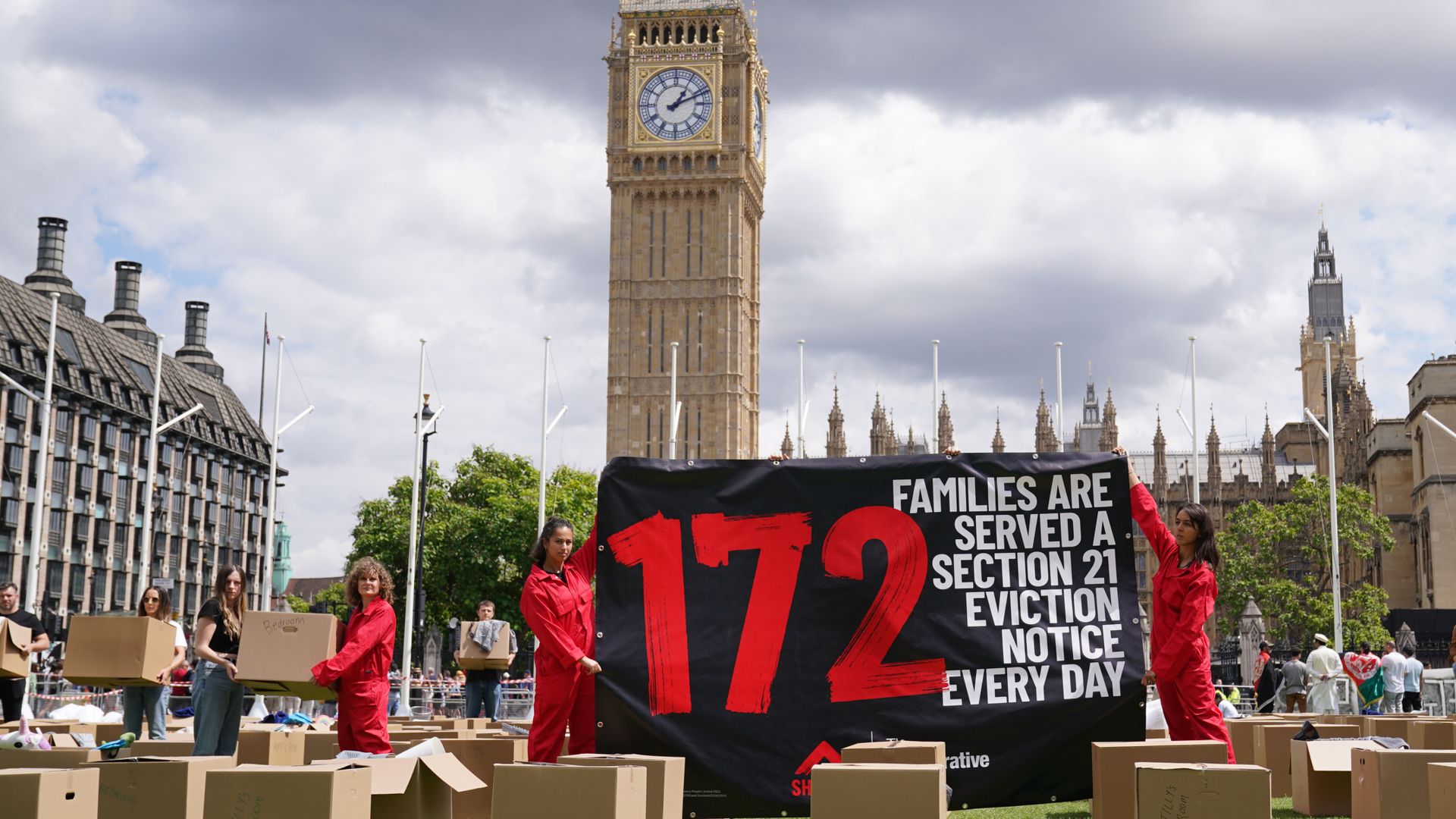The Tories have been accused of caving into “vested interests” after shelving a flagship bill to reform the renting system.
The Renters Reform Bill acted on a 2019 Conservative manifesto pledge to ban section 21 “no-fault” evictions, which have fuelled a huge rise in homelessness.
General Election latest: Tory exodus hits 75 MPs as more announce they’re standing down
The legislation was promised by Theresa May back in April 2019 when she was prime minister, and the commitment was carried over by Boris Johnson and then Rishi Sunak.
However the bill has now been shelved ahead of parliament dissolving on Friday for the summer general election.
Labour accused the Tories of “caving into vested interests” of pro-landlord MPs.
Renters Reform Bill ‘in tatters’
Rishi Sunak admits to ‘difficult days’ after launching general election campaign
‘Bionic MP’ Craig Mackinlay says he won’t contest his seat at general election
Rishi Sunak ‘disappointed’ smoking ban has been shelved – but defends decision to take ‘bold action’
Shadow housing minister Matthew Pennycook said: “The Tories’ decision to cave in to vested interests and abandon their already weakened Renters Reform Bill leaves in tatters the promises they made to private tenants five years ago.
“If the Tories get back in, renters will remain exposed to spiralling costs, poor housing standards and the risk of homelessness from no-fault evictions.
“Labour will turn the page on 14 years of Tory chaos, deliver where the Tories have failed and pass robust renters reform legislation that abolishes Section 21 no-fault evictions immediately and decisively levels the playing field between landlords and tenants.”
‘Another Conservative promise abandoned’
The Liberal Democrats described it as “another Conservative promise abandoned and left in a ditch”.
Please use Chrome browser for a more accessible video player
Today is the last day MPs will sit before the election and several bills are currently being rammed though parliament so they can become law in what is known as the “wash-up period”.
A Labour source said that although they wanted changes to the bill, they were happy to support it in its current form in order for it to pass and it was the government’s decision the shelve the legislation.
Asked if the government has failed renters, a No 10 spokeswoman told reporters on Friday: “No.
“It’s part of the wash-up process that bills are able to be passed where there is a consensus. But of course the government wanted to get this passed and that’s why it was introduced in the first place.”
Read More:
Pensioner hit with “feudal” £17k ground rent bill as leasehold reforms hang in balance
Almost one million renters given no-fault evictions since Tories promised to scrap them
The Renters Reform Bill was first introduced to the Commons in May last year in what was welcomed at the time as a a “once in a generation” opportunity to shake up renters rights.
Its aim was to make the rental market fairer but its progress through parliament was delayed by opposition from some Conservative MPs who wanted to strengthen protections for landlords.
In March its flagship promise to ban no-fault evictions was put on hold indefinitely pending court reforms – leading to accusations the government had “sold renters down the river”.
Housing campaigners angry
Housing campaigners have reacted angrily to the news.
Tom Darling, of the Renters Reform Coalition, said that while the bill in its current form “wouldn’t have made much of a dent in England’s renting crisis”, people have been “badly let down” and it will be the task of the next government to “fix the broken system”.
Polly Neate, chief executive of Shelter, said: “Renters have been shouting from the rooftops about the urgent need for reform, but once again politicians have let them down.”
Leasehold reform in the balance
It comes as a separate flagship housing pledge, to reform England’s centuries-old leasehold system, hangs in the balance.
While this legislation is being debated today, it is not clear if it will include the cap on ground rents that was promised in the 2019 manifesto.
And it might not even pass at all, with reports suggesting Conservative peers opposed to the changes are trying to pressure the government into dropping it.








